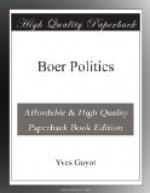My pamphlet, La Politique Boer, and my answer in Le Siecle of the 1st of August, were also distributed. Here are a few extracts:
“The manifesto of Messrs. Fisher, Wessels and Wolmarans, delegates for the South African Republics, has been a disappointment to me. I expected that these gentlemen would produce some arguments; they have contented themselves with giving us a summary of Dr. Reitz’s pamphlet—“A Century of Wrongs.” It ends with the same incitement to annexation, which was already to be found in the cry for help sent on the 17th of February, 1881, by the Transvaal to the Orange Free State—“Africa for the Afrikander, from the Zambesi to Simon’s Bay!” The delegates recognise that the time for claiming new territories has passed; they describe themselves as a nation of mild and peace-loving men, the victims of perpetual English persecution. I do not wish to discuss their way of dealing with historical facts, about which they are not so candid as was Mr. Krueger in his 1881 manifesto, because what we are now interested in, is not that which happened in times long ago, but what has happened since the annexation of the Transvaal by England, on the 12th of April, 1877. They do not say a word of the state of anarchy then prevailing in the Transvaal, nor of its military reserves, nor of the threatening attitude of Sekukuni and Cetewayo. Whereas in the manifesto of 1881, with these facts still fresh in the memory of its author, it is said: “At the outset our military operations were not very successful. In the opinion of our opponents we were too weak to resist successfully an attack from the natives,” Sir Theophilus Shepstone, unable to restore order, had finally to annex the Transvaal. This he did at the head of twenty-five policemen only. Had the Transvaal been left to itself Sekukuni’s and Cetewayo’s impis would have overrun the country and turned out the Boers, who, after they had been delivered from their enemies by the English, proclaimed “a war of independence” in December, 1880. The Majuba disaster, 27th of February, 1881, in which the English had 92 killed, 134 wounded, and 59 prisoners, is of course mentioned by the delegates. An English army twelve thousand strong was advancing; but though the Queen’s speech referred to the fact of the annexation, Mr. Gladstone, who in his Midlothian campaign, had protested against it, agreed to the 1881 Convention in which the independence of the Transvaal under England’s suzerainty was recognised.
“The Boer nation,” the Boer delegates say in their Memorandum, “could not bring themselves to accept the Convention; from all parts of the country protests arose against the Suzerainty clause.” I admit willingly that the Boers did not abide by the Convention. In 1884, speaking in the House of Lords,—Lord Derby said: “The attitude of the Boers might constitute a casus belli but as the Government were not in the mood for war, and the position of the




